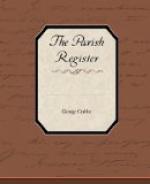A rich-bound Book of Prayer the Captain gave,
(Some Princess had it, or was said to have;)
And then once more on all her stores look round,
And draw a sigh so piteous and profound,
That told, “Alas! how hard from these to part,
And for new hopes and habits form the heart!
What shall I do (she cried,) my peace of mind
To gain in dying, and to die resign’d?”
“Hear,” we return’d;—“these baubles cast aside,
Nor give thy God a rival in thy pride;
Thy closets shut, and ope thy kitchen’s door;
There own thy failings, here invite the poor;
A friend of Mammon let thy bounty make;
For widows’ prayers, thy vanities forsake;
And let the hungry of thy pride partake:
Then shall thy inward eye with joy survey
The angel Mercy tempering Death’s delay!”
Alas! ’twas hard; the treasures still had charms,
Hope still its flattery, sickness its alarms;
Still was the same unsettled, clouded view,
And the same plaintive cry, “What shall I do?”
Nor change appear’d; for when her race was run,
Doubtful we all exclaim’d, “What has been done?”
Apart she lived, and still she lies alone;
Yon earthy heap awaits the flattering stone
On which invention shall be long employ’d,
To show the various worth of Catherine Lloyd.
Next to these ladies, but in nought allied,
A noble Peasant, Isaac Ashford, died.
Noble he was, contemning all things mean,
His truth unquestion’d and his soul serene:
Of no man’s presence Isaac felt afraid;
At no man’s question Isaac looked dismay’d:
Shame knew him not, he dreaded no disgrace;
Truth, simple truth, was written in his face:
Yet while the serious thought his soul approved,
Cheerful he seem’d, and gentleness he loved;
To bliss domestic he his heart resign’d,
And with the firmest had the fondest mind;
Were others joyful, he look’d smiling on,
And gave allowance where he needed none;
Good he refused with future ill to buy,
Nor knew a joy that caused reflection’s sigh;
A friend to virtue, his unclouded breast
No envy stung, no jealousy distress’d;
(Bane of the poor! it wounds their weaker mind,
To miss one favour, which their neighbours find:)
Yet far was he from stoic pride removed;
He felt humanely, and he warmly loved:
I mark’d his action, when his infant died,
And his old neighbour for offence was tried;
The still tears, stealing down that furrow’d cheek,
Spoke pity, plainer than the tongue can speak.
If pride were his, ’twas not their vulgar pride,
Who, in their base contempt, the great deride;
Nor pride in learning,—though my Clerk agreed,
If fate should call him, Ashford might succeed;
Nor pride in rustic skill, although we knew
None his superior, and his equals few:-
But if that spirit in his soul had place,
It was the jealous pride that shuns disgrace;
A pride in honest fame, by virtue gain’d,
(Some Princess had it, or was said to have;)
And then once more on all her stores look round,
And draw a sigh so piteous and profound,
That told, “Alas! how hard from these to part,
And for new hopes and habits form the heart!
What shall I do (she cried,) my peace of mind
To gain in dying, and to die resign’d?”
“Hear,” we return’d;—“these baubles cast aside,
Nor give thy God a rival in thy pride;
Thy closets shut, and ope thy kitchen’s door;
There own thy failings, here invite the poor;
A friend of Mammon let thy bounty make;
For widows’ prayers, thy vanities forsake;
And let the hungry of thy pride partake:
Then shall thy inward eye with joy survey
The angel Mercy tempering Death’s delay!”
Alas! ’twas hard; the treasures still had charms,
Hope still its flattery, sickness its alarms;
Still was the same unsettled, clouded view,
And the same plaintive cry, “What shall I do?”
Nor change appear’d; for when her race was run,
Doubtful we all exclaim’d, “What has been done?”
Apart she lived, and still she lies alone;
Yon earthy heap awaits the flattering stone
On which invention shall be long employ’d,
To show the various worth of Catherine Lloyd.
Next to these ladies, but in nought allied,
A noble Peasant, Isaac Ashford, died.
Noble he was, contemning all things mean,
His truth unquestion’d and his soul serene:
Of no man’s presence Isaac felt afraid;
At no man’s question Isaac looked dismay’d:
Shame knew him not, he dreaded no disgrace;
Truth, simple truth, was written in his face:
Yet while the serious thought his soul approved,
Cheerful he seem’d, and gentleness he loved;
To bliss domestic he his heart resign’d,
And with the firmest had the fondest mind;
Were others joyful, he look’d smiling on,
And gave allowance where he needed none;
Good he refused with future ill to buy,
Nor knew a joy that caused reflection’s sigh;
A friend to virtue, his unclouded breast
No envy stung, no jealousy distress’d;
(Bane of the poor! it wounds their weaker mind,
To miss one favour, which their neighbours find:)
Yet far was he from stoic pride removed;
He felt humanely, and he warmly loved:
I mark’d his action, when his infant died,
And his old neighbour for offence was tried;
The still tears, stealing down that furrow’d cheek,
Spoke pity, plainer than the tongue can speak.
If pride were his, ’twas not their vulgar pride,
Who, in their base contempt, the great deride;
Nor pride in learning,—though my Clerk agreed,
If fate should call him, Ashford might succeed;
Nor pride in rustic skill, although we knew
None his superior, and his equals few:-
But if that spirit in his soul had place,
It was the jealous pride that shuns disgrace;
A pride in honest fame, by virtue gain’d,




